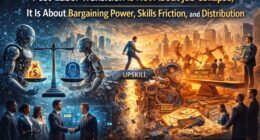By Thorsten Meyer, 28 June 2025
A quick primer
Generative AI pioneer Anthropic has unveiled the Economic Futures Program, a multi‑year effort to fund research, build new data sets and convene policymakers around one pressing question: what will rapid AI diffusion do to jobs, productivity and economic policy? The initiative extends Anthropic’s earlier Economic Index, which already publishes anonymised usage data from its Claude models.
Top picks for "economic anthropic launch"
Open Amazon search results for this keyword.
As an affiliate, we earn on qualifying purchases.
Why Anthropic says the moment is urgent
Anthropic chief executive Dario Amodei recently warned that AI could wipe out “half of all entry‑level white‑collar jobs” within five years, with unemployment potentially spiking to 20 percent.
Those dire projections have intensified calls—from Capitol Hill to Brussels—for hard evidence on where automation is already hitting and how policy should respond. Sarah Heck, Anthropic’s head of policy programmes, argues that debates must be grounded in “evidence, not predetermined views,” and that labs have a duty to open up data and catalyse independent scholarship.
Inside the Economic Futures Program
| Pillar | What it does | Early actions & timeline |
| 1. Research grants | Rapid grants of $10k–$50k plus $5k in Claude API credits for empirical studies on labour, productivity, distributional effects | Applications rolling; first awards mid‑August 2025 |
| 2. Evidence‑based policy forums | “Economic Futures Symposia” in Washington DC (Sept.) and Europe (Q4); winning 2‑3 page briefs present actionable proposals | Policy briefs due 25 July 2025 |
| 3. Measurement & data | Scaling the Economic Index into one of the first longitudinal data sets on AI adoption and economic impact; regular public releases | Ongoing; integrates external researcher feedback |
The three tracks are intentionally linked: better data ⇒ better research ⇒ better‑targeted policy. Strategic partnerships with universities, think‑tanks and multilateral bodies are encouraged, with bespoke API credits and technical support on offer.
How it stacks up against rival efforts
OpenAI’s Economic Blueprint (January 2025) emphasises AI‑literacy programmes, regional “AI economic zones” and infrastructure investment. By contrast, Anthropic’s scheme is narrower but deeper: it subsidises primary research, opens proprietary usage data and seeks near‑term (≤ 18‑month) policy pilots. Analysts view the two as complementary—OpenAI addresses how to grow the AI economy, while Anthropic asks how to cushion or redirect its shocks.
Early reception
- Researchers welcome the six‑month turnaround, which fits academic calendars yet forces timely outputs.
- Policy wonks like that grants cover data acquisition and that symposia invite diverse ideological views—not just UBI advocates.
- Critics note that funding from an AI lab could nudge scholars to “grade their own homework,” though open‑sourcing data mitigates this risk.
What happens next?
- Apply – Economists, data scientists and policy analysts can submit proposals via anthropic.com/economic‑futures today.
- Watch the metrics – Expect the first expanded Index data drop by late summer, coinciding with grant announcements.
- Policy spotlight – Proposals selected for DC and EU symposia will shape talking points ahead of the G20 digital economy meetings later this year.
If the programme succeeds, it could create a virtuous cycle: richer data enable clearer diagnostics, which in turn inform targeted labour‑market transitions, productivity‑boosting incentives and modernised fiscal regimes. If it fails, regulators may legislate in the dark—heightening the risk that AI’s gains accrue to a few while its costs socialise to many.
Either way, the stakes are no longer theoretical. As Anthropic itself admits, “Society’s response to AI is not predetermined.”









